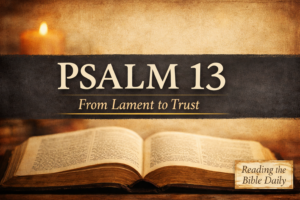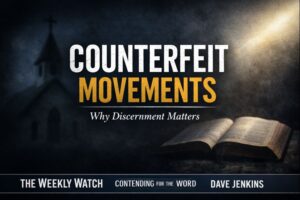⏱️ Estimated Reading Time: 11 min read
INTRODUCTION
The following transcript comes from a classroom experience on “applied theology,” or “pastoral theology.” The lecture that day went to the matter of how to incorporate reading deeply and widely into the ministry, and why such a strategy is important.
In this article, we welcome you to the concept of “Reading Stations” as a method of reading deeply and widely over the decades of your ministerial career.
A LICENSE TO LEARN
Brothers and sisters, I want to talk to you this morning about the necessity to move from seminary to the parish and to cultivate a life of reading. To accomplish this lifelong pursuit, you need a useful method. I want to submit, for your consideration, an approach that I refer to as “reading stations.”
There is going to come a time in your life when you walk across the platform of a chancel in a church or the platform of an auditorium. I will shake your hand and (by the powers vested in me) confer upon you the Master of Divinity degree, or perhaps some of you here will receive your Master of Arts or doctorate. You depart, with your family, in blissful exhilaration; liberated, at last, from the tyranny of your professors’ oppressive syllabi. “Read this, read that” will be ordinal commands that recede into the past like a dream. At long last, you will be able to read what you want to, not what I’m telling you to read! No more honor code statements, “I have read the following.” You will get to read whatever you want to read! How great is that? For so many seminarians thinking about reading for the sake of reading is blessed hope! But, there is something to consider. You need to make that “honor code” statement with yourself. Because, if there is one thing true of the ministry it is this: you must read.
Dr. D. James Kennedy used to tell me, “The Christian minister must love three things to support his vocation. A minister must love God. A minister must love the Scriptures. And a minister must love books.” Dr. Kennedy’s library testified to his admonition. That library was deep and wide. Whether you choose to build a library electronically, or a hybrid of physical copies and electronic (not a bad way to go, but that is another lesson), you need to be reading all kinds of things. But how do you do that? One way to do that is to consider a strategy that I call reading stations. The Reading Stations strategy is a way to help establish a lifetime plan for reading good books.
SO, WHAT IS IT?
A Reading Station method of lifetime reading is not mere multitasking. In fact, while the method incorporates more than one book at a time, in a present iteration, the plan is designed to increase focus for a specific place.
To design a reading station strategy one must first have a reading plan.
What is a Reading Plan?
We will encourage you to consider, not just a plan, but a “Lifetime Reading Plan.” Such a plan should incorporate different genre, from theology to detective novels, poetry to the “Great Books,” and even true crime, and, of course, plenty of history, biography, sermons, and ministry literature. I tell my preaching students, “Read preachers! Read all kinds of preachers. Read their sermons. Read their books. Read their biographies and autobiographies.” And yet: reading preachers is but one genre in an encyclopedia of genres that you should read across your ministry.
One way to create a plan is to, well, do it yourself. There may be quite a lot of joy for you in doing that. If so, why not? Allow me to challenge that just a bit. What if others have already studied the matter for you and you can begin with a sort of Lifetime Reading Plan “template?” Then, you can adjust to suit your tastes or needs. Some reading plans are designed to fill in what you missed earlier in life. Let me put it another way. Some of the greatest goals ever accomplished successfully were done so by “standing on the shoulders of giants.” Consider, for instance, Eugene Peterson’s, Take and Read: Spiritual Reading—An Annotated List. I consider this volume by the noted pastoral theologian to be the best in the class. There are others.
Rather, reading stations is a method for fulfilling a lifetime reading plan by diving your life into “stations”—places—where you can read in one day and assigning a certain genre to each “station.” You may be, for instance, in the morning reading a devotional with your family of a preacher – last year I went through Matthew Henry, this year I’m going through George Whitefield. This morning we read a hymn of George Whitefield as we reflected on a particular scripture. You are also going to have to read preachers: sermons biographies, controversies, and devotions. There are theologians that we could not cover in the curriculum of this seminary that you should consider. There are artists, poets, novelists, essayists, physicians, and philosophers to meet. There are works of art to view. There is a life of learning awaiting you. Reading stations might more nearly aid you in consuming a healthy intellectual diet of various, delightful, and helpful literary nutrients.
MAPPING OUT YOUR READING STATIONS
Morning
So, morning reading is one station. Perhaps, that station is at your bedside, or on your patio, or in a coffee shop, or with your family, at the breakfast table. If you use this as your daily devotional, then read the Bible. Perhaps, choose a daily lectionary like the English Standard Version Daily Lectionary. We can also commend the daily and Sunday lectionaries by the Anglican Church in North America (ACNA). Shaping your walk with Jesus Christ by the daily office of readings and prayers, for family, and for personal devotions, remains the single greatest discipleship method. Adding a daily devotional can also provide good solid spiritual food for this first station.
Lunchtime
Another reading station could be your briefcase which ends up being your lunch-reading. I think that is a good time for systematic theology or other parts of the theological encyclopedia, particularly systematics, religious issues, hot topics, and so forth. Lunchtime is a good time in the day to read such works. I spent some time having lunch with a given Swiss theologian.
Evening and Bedtime
There are other stations that you might want to identify. Perhaps, you have a favorite chair at home. Keeping academic and professional journals next to your chair for evening reading is a good approach. Naturally, your study can be a station (at work or at home; a study can be in a number of places: an extra bedroom, the kitchen table, and anywhere you can negotiate with your better half!). This might be a good place for poetry or literature. Then, of course, there is your bedside, and there I would advocate biography.
There are other stations you can create but in doing this you see how the pastor can follow the instruction of the Word of God and that is to continue “training in the words of the Faith and the good doctrine that you have followed” (1 Timothy 4:6))
My Own Experience
I will give an example from my own experience. I graduated from a Christian college and then I went to seminary. I went through five years of postgraduate study in Theology for a Ph.D. at the University of Wales. I went to the University of North Carolina at Chapel Hill for post-doctoral research that led to a Master of Public Administration.
In all of my education in the humanities and the social sciences, I read very little of Karl Barth. I should have. Barth is undoubtedly the most influential and prominent theologian of the twentieth century. I didn’t say the best theologian or the most useful. In my estimation, he is neither. But he was unquestionably the most prominent (that, of course, is disputable, but I didn’t read enough of Barth to know). So I dedicated myself to learning, for a year, about Barth, Barth’s ideas, and then I began reading Barth.
Some do the opposite—read the author and then read books about him—but I am glad that I sequenced my approach as I did. It was right for my learning style. Incidentally, I may have said this before, but Dr. Douglas Kelly ) now, retired professor of systematic theology at Reformed Theological Seminary) probably knows more about Karl Barth than many Bartian scholars even at the Bartian Institute. Kelly knows Barth so well because of Dr. T.F. Torrance, his mentor, and supervisor from the University of Edinburgh. But I didn’t know enough about Barth. I learned about Barth, read about Barth and finally stuffed volumes of his church dogmatic into my bulging briefcase. Why am I reading him at lunch, my other reading station? Well, to be forthright, devouring portions of Nicholas Wolterstorff while managing an egg-salad and swiss on toasted sesame-seed bagel goes down easy for me. I don’t read systematic theology before bed. Why? The concepts stimulate, rather than sedate. I read a biography or other narratives at bedtime. Martin Lloyd-Jones gave similar advice about bedtime reading in his lectures to his students in his Westminster Pastors’ Conferences at Westminster Chapel, London. Use the “bedside” reading station to help you hum “Great is thy faithfulness” to your soul, as you go to sleep. I remember very peaceful moments with the Lord as I read Amy Carmichael’s biography. As I read of her trials, her faithfulness, and God’s presence, I was comforted: “If the Lord did this for Miss Amy, He would also rescue me.”
In the morning I read the Daily Office. I read Barth at lunch. I read from journals in the evening. I read biographies at evening. I incorporated poetry along the way. Sermon preparation is not separate from the rest of my devotions. Indeed, one’s vocation is also one’s sanctification. Thus, the work of pastoral counseling, visitation, sermons, Bible studies, and even business meetings give me an opportunity to select from my own lifetime reading plan.
Concluding Word
There is nothing more important in your ministry that continuing your training. I want you to consider your Master of Divinity “a license to learn.” Don’t think of it as a terminal degree in your professional preparation for the Gospel Ministry. You’ve gone through a time of development, but now you’re being catapulted out into the parish ministry, a missionary ministry, or a college ministry, the chaplaincy; and now you have, Lord willing, a lifetime of opportunities to redeem the time by reading deeply and widely. Such a plan will not only strengthen your ministry. It will bless your life.
So, begin.
BIBLIOGRAPHY
Adler, Mortimer Jerome, and Charles Van Doren. How to Read a Book, 2014.
Bagster, Samuel, Jonathan Bagster, and Christopher Glyn. “Daily Light on the Daily Path (Updated from the Holy Bible King James Version) : Morning and Evening Daily Devotions from the Classic Devotional Book.” Last modified 2014. http://search.ebscohost.com/login.aspx?direct=true&scope=site&db=nlebk&db=nlabk&AN=680689.
Bloom, Harold. The Western Canon : The Books and School of the Ages. London: Papermac, 1996.
Cowman, L. B. E., and Jim Reimann. Streams in the Desert: 366 Daily Devotional Readings. Revised edition. Zondervan, 2008.
Elliot, Elisabeth. A Chance to Die : The Life and Legacy of Amy Carmichael, 2005.
Henry, Matthew, and Randall J. Pederson. Matthew Henry Daily Readings. Fearn, Tain, Ross-shire, Scotland: Christian Heritage, 2009.
Needham, Nicholas R. Daily Readings from the Early Church Fathers, 2017.
Pederson, Randall J. The Puritans : Daily Readings. Fearn, Ross-shire: Christian Focus Publications, 2012.
Peterson, Eugene H. Eat This Book: A Conversation in the Art of Spiritual Reading. Wm. B. Eerdmans Publishing, 2006.
———. Take and Read: Spiritual Reading–An Annotated List. Wm. B. Eerdmans Publishing, 1995.
Whitefield, George, and Randall J. Pederson. George Whitefield, Daily Readings. Ross-Shire, Scotland: Christian Heritage, 2010.
“Anglican Church in North America.” Accessed September 17, 2018. http://anglicanchurch.net/?/main/texts_for_common_prayer.
“BBC’s Top 100 Books You Need to Read Before You Die – How Many Have You Read?” List of Challenges. Accessed September 17, 2018. https://www.listchallenges.com/bbcs-top-100-books-you-need-to-read-before-you-die.




